Emboldened Faith
that with all boldness they may speak Thy Word.”
(Acts 4:29b)
morning in the early 1960s. They thought they were hearing an angel sing. Juliet
was standing up in the choir loft, her vibrant voice rising and falling upon
the people in the pews below. Juliet’s high notes reverberated with such
strength that it shook the old church building. Jean bellowed along on the old
pipe organ with equally loud exuberance. This was a musical match made in
heaven.
Lowder delivered a remarkable sermon to his small church. “Charlie,” as he was
affectionately called by his parishioners, expounded on Galatians 3:29: “And if ye be Christ’s, then are ye Abraham’s seed, and heirs
according to the promise.” He concluded with verse 28: “There is neither Jew nor Greek, there is neither bond nor free, there
is neither male nor female: for ye are all one in Christ Jesus.” Charlie was
a diminutive, balding man with a pleasant countenance. The children in Sunday
School informed their teacher that they knew what God looked like—Rev. Lowder.
2000 people situated amidst the verdant cornfields of Illinois. Rev.
Lowder’s church was made up of people with long proud lineages of European Christian
ancestry. One family tracked back twelve generations to the Massacre of St.
Bartholomew’s. Another family still spoke German at home. The McLaren’s came from
Scotland, and Mrs. Dodge’s father had been an English parson. But Charlie
proclaimed that the church of Jesus Christ was more diverse than this and it
was time—it was time—to recognize that “red
and yellow, black and white, they are precious in His sight.” The
congregation would sing that song many times.
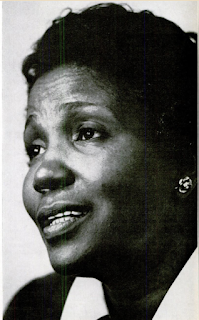 |
| Juliet |
about the life of Jesus and His disciples. It was not surprising then that
Charlie next took the radical step of opening the church to Juliet and her church
people. And then an amazing miracle happened – they came! Afterwards Juliet was
invited to sing solos regularly with the choir. Scuttlebutt in the village soon
called it “the nigger church.” But that didn’t deter Charlie, nor his church
folks. They stood on the truth in his sermon.
life-changing sermon. Here is how Jean described it:
morning, back in the 1960s.
study the music for my voice lessons?” It was Juliet, a black woman I’d met two
years before when she sang at our church where I was the organist.
because of the sermon yesterday?” Juliet had again been our vocalist, and the
sermon we both heard was a powerful one titled “Unlimited Horizons.” Our
minister’s point was to “get out there today and do what you have been putting
off, things you know God wants you to do.” Already that morning his wife had
called me to start piano lessons, and it had also moved me to place an order to
a music store for some Ragtime piano pieces (something I had always wanted to
play).
answered. “I’ve decided to really concentrate on my voice.”
knew I was perfectly suited for the job. Juliet had been cleaning houses to pay
for her voice lessons. Life was hard for her; she had ten children to support
because her husband was unable to work due to a construction accident.
(Acts 17:11b)
became a busy place as Jean bustled around organizing her life so she could practice
her piano in the den for hours every day. Jean had given birth to four children
in the 1950s, the youngest two of which who were premature and required much
care. She was a typical housewife of that era, and along with her husband Paul
was joyfully renovating a vintage 1840s house. Jean was a classically trained
pianist and organist. She could play Bach exuberantly on an organ one hundred
miles an hour with a hint of syncopation. No one had ever heard anyone play
Bach like that. But it seemed like the perfect way Bach should be played.
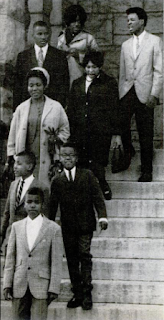 |
| Juliet with some of her children |
Joliet. She had to support her own family. Nevertheless she said she would give
up a day of work and come to Jean’s house for vocal practice. She knew this was
what God wanted her to do. There was no doubt in her mind about her calling
from the Lord. Thus each week she bravely boarded the bus in Joliet that would
drop her off at the main intersection in the village where she could easily
walk the three blocks to Jean’s house.
about 10 A.M. But Juliet didn’t come and she didn’t come. Jean got worried.
When Juliet finally arrived at the front door she practically fell into Jean’s
arms. She looked frazzled and had been crying. It turned out that the local
police had been contacted by someone spotting a Negro walking down the
sidewalk. She had been harassed and told to leave town.
but Juliet wouldn’t let her. Juliet wiped her tears and gazed long and hard at
Jean. In very strong terms she asserted that this is precisely what Jesus
meant when he said to “turn the other cheek” and love our enemies (Luke
6:27-19). Juliet took Jesus’s words literally, she admonished, and so should Jean.
Jean was amazed at her pure faith. From that day forward Juliet and Jean would
share their faiths together in God’s leading, His providence, grace and
protection.
to the bus stop that day in an antique model A that was the only family car at
the time. When Jean got home she did call the police station and politely explained
that there was a Negro lady who would be coming to visit her house every week
on a Tuesday morning. “Leave her alone, she’s my friend!” Jean warned. She
thought that would take care of the problem.
that, and the week after that. By this time Jean threw one of her classic
“fits” and called the police demanding that they put a stop to this. “Juliet
isn’t breaking any laws. It is a free country and she has a right to walk down
the public street!” Jean demanded. The police explained that they “had to do it
because neighbors complained.”
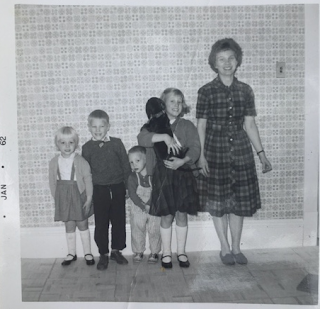 |
| Jean with her 4 children and Gus the dachsund |
best friend Nan lived in a house halfway between the bus stop and Jean’s house.
Nan loved Juliet and was sympathetic to the cause. From then on Nan stood guard
at her window, watching for Juliet walking by her house. Nan would then race out
of her house and stand with her hands on her hips, glaring at the police car
slowly following Juliet’s steps down the sidewalk. Jean and Nan couldn’t
believe that anyone would think that Juliet, a mother of ten children and wife
of a handicapped husband, posed a threat to anyone. Nevertheless the
intimidation continued.
drove into the south side of Joliet and picked up Juliet to take her back to her
house. It was a move that required courage, because Jean also, just like
Juliet, stood out in a neighborhood of different color. But God gave them both a
holy boldness that enabled them to set aside all fear and prejudice, social
ostracization and ridicule. During the years they rehearsed together, the turbulence
and violence of the 1960s Civil Rights Movement was always lurking in the
background, sometimes in the foreground. There were even race riots in Juliet’s
neighborhood after Martin Luther King, Jr., was assassinated. Both women were
afraid. Yet they openly associated and were undeterred because God had told
them to do this.
to confound the things which are mighty;”
(1 Corinthians 1:27b)
woman found in the other what they needed “for such a time as this” in their
lives (Esther 4:14). Juliet needed a gifted pianist who would not be daunted by very
difficult pieces of classical music. Jean, who was very smart and classically
trained, wanted to be more than “just” a housewife. Juliet’s need made Jean use
her gift—and vice versa. Jean’s began to realize that her calling in life might
be to become a professional pianist just as Juliet knew her calling was to sing.
When they rehearsed together Jean’s whole house rang with music. Even Gus, Jean’s
dachshund, would sometimes join in with howling.
Friends of influence in the background were working towards giving Juliet an
opportunity to do formal concerts. Dorothy from the church, a reporter for the
area newspaper and a staunch friend of Juliet, wrote articles to promote
her. In the beginning a handful of brave churches in central Illinois invited
Juliet to sing. This encouraged and motivated the two ladies even more. Jean
would practice hours every day until she had the complicated classical songs
memorized. Juliet would sing all day, with or without accompaniment, but working
together they fine-tuned their skills and repertoire.
 |
| Program for one of Juliet’s concerts |
church. It was a Sunday evening in the middle of winter and the snow was thickly
falling. It took an hour and a half of skillful driving by Paul to get them
safely there. Despite the weather the church was all lit up, bright and cheery,
and the pews were rapidly filling up with a large attendance. Upon arrival
Juliet and Jean requested to use the ladies’ bathroom before the concert. However,
Juliet was informed that “her type” was not permitted to share the facilities.
Yet there were no other bathrooms in this church and it was a Sunday night when
everything else in this town was dark and closed. Once again Jean threw one of
her famous “fits.” She grabbed Juliet’s elbow, turned her around, and marched her
straight into the bathroom.
a special elegance and grace and was gifted with a strikingly beautiful
appearance. Her temperament was humble but spirited. She stood on that sure
foundation of her faith in Jesus Christ. She prayed constantly—often out loud
in the middle of a conversation with Jean when the need arose. She knew her
Scriptures and often quoted Bible verses, especially from the Gospel of Luke. She
had a teachable spirit, and her fervent desire to sing skillfully was a
testimony of perseverance.
and do not the things which I say?”
(Luke 6:46)
it a practice at her concerts to “preach.” That’s what Jean called it, but in
reality it was a bit of Scripture and testimony. Juliet simply inserted a time
for her little “talk” into the body of the program, sometimes surreptitiously,
sometimes scheduled. She believed she was an ambassador for Christ—she knew
that for some of the people attending her concert that she was the first Negro
they’d ever seen up close. In those tumultuous days of the mid 1960s people
only knew what they heard and saw on television. How wonderful that their first
introduction to a real live black person was a charming eloquent lady who
praised God in song, word and life. Juliet was a one-lady battering ram, gently
breaking down walls with a four-octave voice and modest sweetness.
absolutely loved—was Negro spirituals. In the middle of a program of classic
Bach, Puccini, and Handel, Juliet would belt out a classic like “Swing Low, Sweet Chariot.” She was not
ashamed of her heritage. In fact, Jean loved it, too! Jean was passionate about
spirituals and loved Ragtime and Dixieland music. True to her commitment after
Charlie’s sermon that day, Jean had purchased a collection of Ragtime music.
She exuberantly began to play spirituals with animated syncopation. Intrigued
by the history she began to research the roots of the rare female composers in
these genres and decades later would publish a scholarly monograph about her
findings.
 |
| Juliet recording for television |
to help launch her career. Dorothy would testify that this was a direct result
of that very same sermon by Rev. Lowder. She jumpstarted a group of volunteers
who were willing to help Juliet become a professional. Soon Juliet was taking
private voice lessons from a professor. She had to learn German, Italian,
French and Spanish. Jean helped with the Spanish. People supplied Juliet’s
needs in one way or the other, donating time, talent and/or money. One man and
his wife drove her into Chicago once a week for her voice lessons. An account
of her life was published in a September 1970 article titled “Song of Praise,” in The Rotarian.
Describing Juliet’s life and testimony, Harold Finley wrote:
faultlessly gowned, immaculately groomed, with a figure more like that of a
model or an actress than like the usual operatic soprano. Her poise and
gracious platform manner are the result both of humility and the realistic
knowledge that she has a tremendous talent….
genuine humility. She had a deeply religious mother, whose principles about cleanliness
and devotion to church were never compromised by the exigencies of poverty or
racial discrimination.
without taking time before the appearance to pray for God’s help, and after the
service to thank God for the joys she always finds in singing.
her share of hard work. She is the mother of ten children, nine boys and one
girl. Five of the boys have been in the Service, three in Vietnam, and two are
overseas at present. Mr. King has never fully recovered from an industrial
accident suffered 11 years ago, so Juliet must produce most of the family
income.
pitifully small house and the wind whistling through the cracks in the floor
and walls when her children were small and her husband’s condition seemed
desperate. She continually hesitated to ask more favors of a kindly aunt and a
few other loyal relatives and friends. It was on one such occasion that God’s
answer to her prayers seemed to be that her voice had been given her as
salvation and support.
question at that time, she resolved to get musical training. Now looking back,
she believes that she would have “gone to pieces” without that resolve and the
faith that God would see her through.
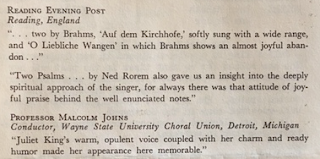 |
| Praise from a September 29, 1974 concert program |
central Illinois which her parents ran for decades. Jean’s parents were not
affluent, but she grew up having everything she needed. They were dedicated Christians
and it was in church that Jean met her future husband Paul. Paul’s mother Agnes
was a gifted church organist and would play for churches all her life.
to Juliet they informed their parents. Amazingly their parents supported them
in this new venture, albeit with some fear and concern for safety given the
volatility of the 1960s uprisings. But Jean’s mother’s heart melted the day she
met Juliet face to face—it was love at first sight. And Paul’s parents had a
long history of helping needy people one-on-one in tangible sacrificial
ministry. Juliet was just a continuation of their family’s living faith. In
fact, Paul quietly donated his money, his time, his talents, and even a car or
two, to further Juliet’s career.
for it is the power of God unto salvation
to every one that believeth;
to the Jew first, and also to the Greek.”
(Romans 1:16)
singing, the den windows were open. Her strong soprano voice filled the neighborhood.
A neighbor sauntered over and sneered at one of Jean’s children, “I see your
mother has that nigger lady over again.” Shocked, the child ran into the house
and informed Paul. Paul immediately strode over to the neighbor’s and told him
it wasn’t appropriate for him to use that offensive term around children. Paul
then instructed the children that night at the dinner table that they were
never, ever, ever to use that word—and Jean reinforced it by pointedly
reminding them that she wasn’t opposed to washing mouths out with soap. But Jean’s
children loved Juliet and couldn’t even imagine calling her that bad name. They
even told their friends in the neighborhood that they couldn’t use that nasty term.
party to introduce Juliet to all of the “different” people in town—professionals,
and people of other faith, nationality and ethnicity who for various reasons weren’t
welcomed in the social mainstream. The main dish on the menu that night was a gourmet
wild rice seafood casserole. Juliet, also a fabulous cook, helped prepare the
meal and sang gloriously for everyone. The next door neighbor likely heard her
powerful voice ring out that night.
of him shall the Son of man be ashamed….”
(Acts 9:26a)
sermon, this time about the Good Samaritan, asking the question from Luke 10:29,
“And who is my neighbor?” The Sunday
School classes studied it, too, and, dressed in character, they acted it out as
a play in front of the congregation. Everybody got the message, “For there is no respect of persons with
God.” (Romans 2:11). Once again Charllie’s sermon took root in the families
in his congregation and bore much fruit for generations to come. The church
people not only accepted these Scriptures but began to live them out in real
life ways. The church would also financially support Juliet for many years.
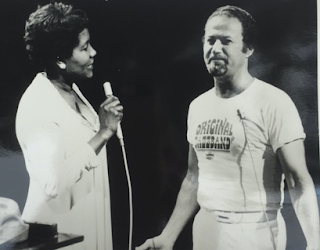 |
| Juliet with Sacha Kliass in Brazil |
York. She auditioned to sing professionally with the fine arts community in Chicago
but, despite her superior accomplishments, she was turned down for a lesser
candidate. Jean and other friends privately believed that it was due to prejudice.
By this time Juliet was being called “Another Marian Anderson.” She would go on
to become the first female vocalist to give a concert at Westminster Abbey. She
performed at military bases throughout Europe and for church conferences in
Switzerland and Sweden. In 1975 Jean moved to Brazil for four years. She
invited Juliet to come to San Paulo and sing for churches and with a Dixieland jazz band headed by Sacha Kliass.
for obedience to the faith among all nations,
for His name:”
(Romans 1:5)
professionally with her husband Paul. She produced many tapes and CDs, composed music and became
widely published in her field of expertise. Her favorite music remained the old
Negro Spirituals, which Jean always played with fervent animated syncopation.
She continued on as a church organist, gave piano lessons, became an elementary
school teacher, and encouraged all of her grandchildren to become musical.
Juliet continued to give concerts until the end of her life, and worked as a
prison guard in her later years.
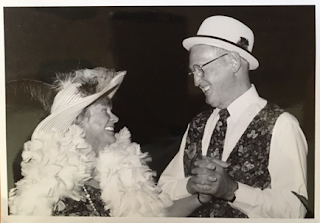 |
| Jean & Paul |
around in the background during the decade that Jean and Juliet started their
musical careers together. Their lives would bless others across the world in
ways that could never have been imagined those sunny Sunday mornings when Rev.
Lowder delivered his life-changing sermons. It all began at a time of turmoil
and riots, violence and hatred. Yet these two women heard the Lord speak to
them. God told them to do something positive with their talents that could
bless someone else—against all odds and despite all opposition, fears and
threats. And they walked through these hazards with grace and dedication.
was a time of great racial and political turmoil in America. Yet these two women
determined that they would be a living example of Christlikeness, kindness,
gentleness and love. They openly expressed the hope that their lives would be a
testimony and that others would learn from their example.
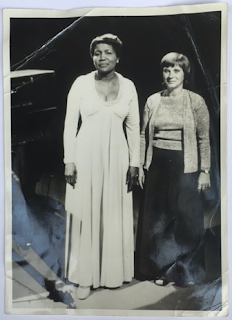 |
| Juliet with Jean in Brazil |
I was an eyewitness. As a child I had a frontrow
seat observing these things that I write about. What did I learn from these two
godly women? Courage in the face of fear. Steadfastness to fulfill God’s
calling. These women believed in a literal hope in Scripture. I learned that faith
must have shoe leather; and that discerning the times may require living
against cultural norms.
an official church “vision,” “plan,” “program” or “purpose.” Rev. Lowder
preached simple sermons from God’s Word and then followed through. He was a sincere
man who was humbly obedient to speak what God had laid on his heart. He also
evidenced extraordinary courage in the face of opposition. So did many of his
parishioners.
to the call of Jesus Christ, boldly obeying His Word and courageously following
His Spirit. The cause of Christ was advanced by these meek people doing good
and honorable, brave and courageous, decent deeds of goodwill and friendship.
It
is time to spread the message of Charlie Lowder’s “Unlimited Horizons” Gospel
sermon once again:
Yea rather, blessed are they
that hear
the Word of God,
and keep it.”
(Luke 11:28)
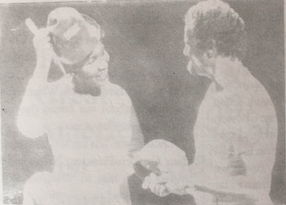 |
| Juliet with Sacha |
Special Notes:
Article authored by Sarah Huling Leslie. Special mention to Paul T. Huling, husband of Jean, who immensely helped Juliet behind the scenes during all of these events. Jean and Paul would stay in touch with Rev. Lowder for many decades after he moved on in the pastorate. Jean would go on to become “Sister Jean the Ragtime Queen” professionally, and Paul, who learned to play the washboard from Sacha Kliass in Brazil, would go on to become “Laundry Fat,” accompanying Jean on the washboard.
Special credit is due to Dorothy Cryder the faithful reporter for the Joliet Herald News who furthered Juliet’s career so ardently.
Photos are from the author’s personal collection and from Harold Finley’s article “Song of Praise” in The Rotarian, September, 1970 (Vol. 117, No. 2), p. 18.
Jean’s article is excerpted from “One By One: Juliet, remembered by Jean,” originally published in The Christian Conscience, October 1997 (Vol. 3, No. 8), p. 20-21.

